#anastasie de lafayette
Note
What did Lafayette's children call him? Did they have a good relationship? I imagine that he was a very loving and doting (albeit absent-minded) father, but I just want to know the facts to defrentiate from my headcanon. :)
Dear Anon,
thank you for the question. I can confirm you headcanon. :-)
La Fayette and Adrienne both were very loving and attentive parents. While it is true that La Fayette was often physically absent (Revolutionary War in America, visit to America, tour throughout Europe, imprisonment during the French Revolution as well as several shorter travels) he was not absent-minded. Whenever near or far from home, his children always had a very prominent place in his correspondence and he constantly inquired after them, showed his anxiety concerning their health and happiness and showered them with kisses and embraces. While at home he certainly was not as hands on as a “modern parent” but he and Adrienne were definitely more hands on and included their children in more things than the average noble couple at their time would.
As to names that his children might have had for him - here I have to guess, since my collection of letters between La Fayette and his children is way smaller than I would like it. There is one letter from Anastasie, La Fayette’s oldest surviving child, to George Washington where the little girl refers to La Fayette as “Papa”. Now, this letter was written when she was still very young so her way of addressing her father might have changed over the years. Secondly this letter was written in English, and she might have had other terms when using her native French. Last but not least, this letter was somewhat “official” and Washington, while a close friend, was still a family outsider.
I know that La Fayette and Adrienne, while often using very endearing terms and phrases in their private correspondence, still mostly used the more formal “vous” when referring to each other. It was rather common for children to likewise address their parents in a more formal manner and I could imagine that La Fayette’s children did so as well. But this is only a presumption on my part.
I hope this still helped somewhat and I hope you have/had a lovely day!
#ask me anything#anon#marquis de lafayette#la fayette#adrienne de lafayette#adrienne de noailles#anastasie de lafayette#george washington#letters#1784#french history#american history
61 notes
·
View notes
Text
Some Paintings of Lafayette and his family in Olmütz prison
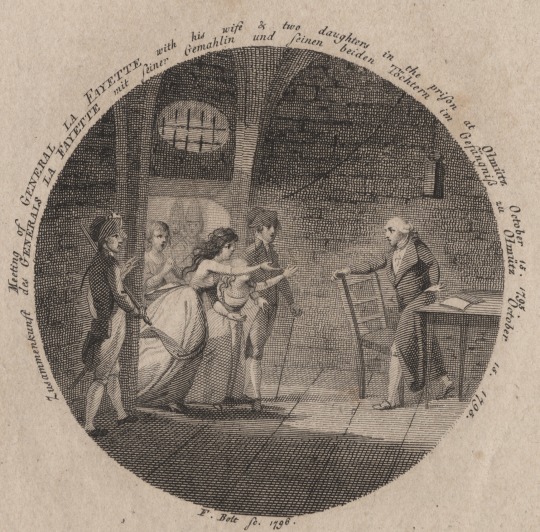
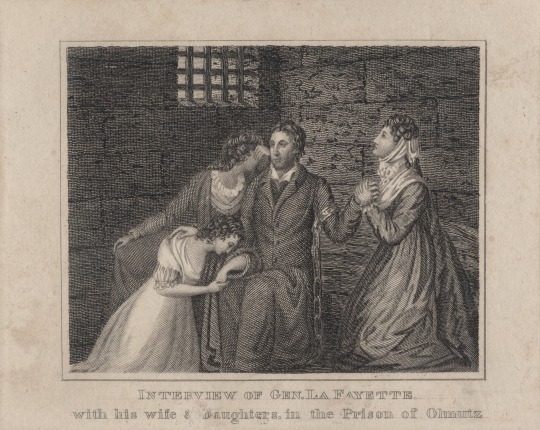
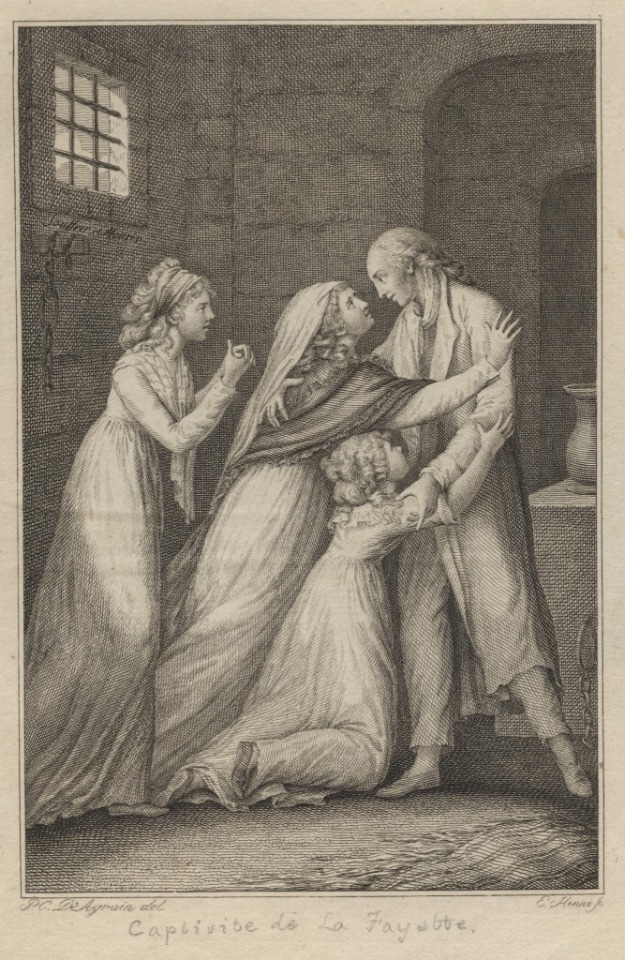

source
#lafayette#marquis de lafayette#adrienne de lafayette#anastasie de lafayette#virginie de lafayette#lafayette children#the french revolution#frev#french history#paintings
34 notes
·
View notes
Text
“Inside the house he found his two children---‘grown up so much that I find myself [a] great deal older than I apprehended.’ A rapid fire of questions revealed that Mme de Lafayette was not at home. She had gone to the Hôtel de Ville to attend a banquet given by the king and queen to celebrate the birth of their long-awaited son three months earlier. It would probably be hours before Their Majesties could decently leave, and no one would presume to leave before them. Then it would take hours for the procession of coaches to move along the wintry streets in appointed order as the ladies accompanied the queen to the château of La Muette near the Bois de Boulogne.”
—Lafayette In America by Louis Gottschalk, Chapter XV, pg. 348. Despite the fact that Lafayette had returned from America, the etiquette amongst French nobility prevented Adrienne and Gilbert from seeing each other the moment he arrived.
#marquis de lafayette#marie antoinette#king Louis xvi#adrienne de noailles#adrienne de lafayette#anastasie de Lafayette#virginie de lafyette#Lafayette in America#Louis gottschalk#chapter xv#pg. 348
15 notes
·
View notes
Text
“Shh… they’re falling asleep..”
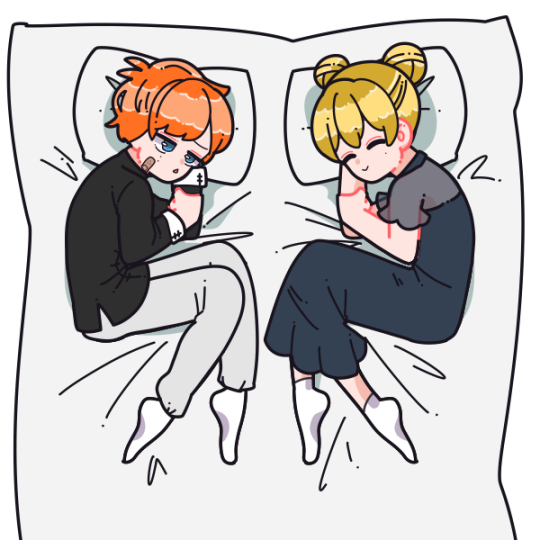
2 notes
·
View notes
Text

❝ ℂ𝕙𝕚𝕝𝕕𝕓𝕚𝕣𝕥𝕙 𝕚𝕤 𝕞𝕠𝕣𝕖 𝕒𝕕𝕞𝕚𝕣𝕒𝕓𝕝𝕖 𝕥𝕙𝕒𝕟 𝕔𝕠𝕟𝕢𝕦𝕖𝕤𝕥, 𝕞𝕠𝕣𝕖 𝕒𝕞𝕒𝕫𝕚𝕟𝕘 𝕥𝕙𝕒𝕟 𝕤𝕖𝕝𝕗-𝕕𝕖𝕗𝕖𝕟𝕤𝕖, 𝕒𝕟𝕕 𝕒𝕤 𝕔𝕠𝕦𝕣𝕒𝕘𝕖𝕠𝕦𝕤 𝕒𝕤 𝕖𝕚𝕥𝕙𝕖𝕣 𝕠𝕟𝕖. ❞
– ɢʟᴏʀɪᴀ sᴛᴇɪɴᴇᴍ
First Royal!AU art in a while,, ay.
I don't think I ever drew Henriette for this before. She's lovely,,
(Alternative title: when you hubby knocks you up only to fuck off halfway across the globe and leaves you to deal with it by yourself)
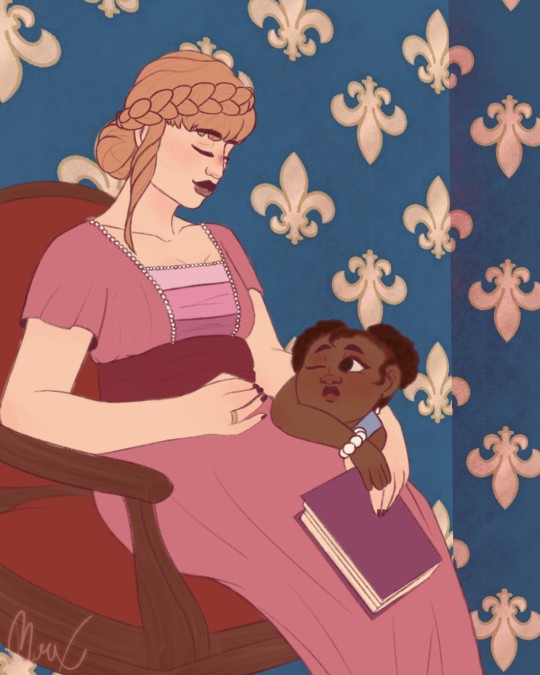

#my art#digital art#fan art#art#hamilton an american musical#hamilton fanart#fanart#hamilton au#royal au#adrienne de noailles#adrienne de lafayette#henriette de lafayette#lafayette#gilbert du motier marquis de lafayette#pregnancy#anastasie de lafayette#quote#ways of reality
19 notes
·
View notes
Text
From George Washington to Anastasie de Lafayette, 25 November 1784
-To Anastasie de Lafayette-
Permit me to thank my dear little correspondent for the favor of her letter of the 18th of June last, & to impress her with the idea of the pleasure I shall derive in a continuation of them. Her Papa is restored to her with all the good health, paternal affection & honors, her tender heart could wish.
He will carry a kiss to her from me, (which might be more agreeable from a pretty boy) & give her assurances of the affectionate regard with which I have the pleasure of being her well wisher,
This is just the cutest thing ever☺️. Washington saying a kiss from a pretty boy will de more agreeable, just killed me Lol
#george washington#Anastasie de Lafayette#Lafayette#awwww#Adrienne de Lafayette#gilbert de lafayette
16 notes
·
View notes
Text
Anyway wip of a drawing I'm making :)
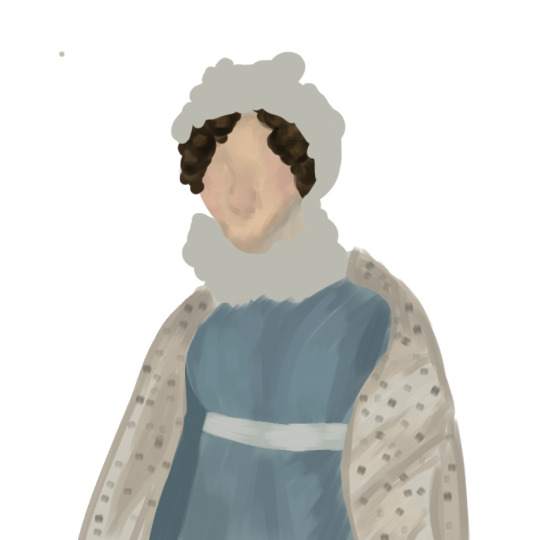

9 notes
·
View notes
Quote
Unlike other European parents, Adrienne and Gilbert did not keep their children at a distance with stone-faced tutors and governesses. They adored their children openly-embraced them spontaneously and showed them off to all their guests, no matter how distinguished. Even the venerable Franklin had to listen patiently and force a smile as seven-year-old Anastasie and give-year-old George sang children’s songs in English.
Harlow Giles Unger, Lafayette, (2002) p.208
#lafayette#marquis de lafayette#gilbert du motier marquis de lafayette#gilbert de lafayette#adrienne de lafayette#adrienne de noailles#marquise de lafayette#benjamin franklin#anastasie de lafayette#georges washington de lafayette
86 notes
·
View notes
Text
The French Revolution Six ladies in waiting!

On the blue guitar: Olympe de Gouge
On the red bass: Manon Roland
On the keys, in this drawing, kneeling at the front: Anastasie du Motier de Lafayette
On the drums: Marie-Therese Charlotte, or Madame Royale
Once again, I’m not satisfied with the colouring due to the bad quality of the paper and I’m so sorry for the weird shade on Olympe, my pen was dying and making a weird colouring.
#french revolution six#french revolution#six#six the musical ladies in waiting#six the musical#ladies in waiting#olympe de gouges#manon roland#anastasie de lafayette#anastasie du motier#marie therese charlotte#madame royale#band
31 notes
·
View notes
Text
At Last.
Pairing: Lafayette x Reader
Word Count: 837
T/W: Fluff, children, and Laf being who we all know and love
A/N: Historical era
@st-riley-the-brave, keep on loving him. Just like the rest of us. Thanks for the request.

January 1782
“Madame de Lafayette, your requested brush” One of your servants held out a wooden paint brush to you.
Your eyes glittered up “Thank you, Jacques, I needed this one” you gracefully took the brush out of his hand and twirled it around your fingers “I needed this one for the small details”.
You dipped the brush into a hazel brown paint and put it to your canvas, carefully maneuvering your hand.
That is until you felt a tug at the bottom of your dress.
A little girl, no more than 5, with extravagantly curly hair and perfectly defined rosy cheeks smiled back at you as you peered down.
She stared at your canvas. “Is that papa?” She asked twirling around a piece of hair.
You sighed, you were trying to paint to get over the fact that the love of your life was gone. You painted him not as all his other portraits had portrayed him; The high and noble hero, but as your husband, Gilbert.
The portrait was a smiling and bared a striking resemblance to the real man. Hair; wigged and powdered, cheekbones; defined, smile; on and those beautiful eyes of his.
“I suppose it is, Ana, but I’m not quite finished” You wiped your hands on a cloth and took off your apron. Looking out into the bustling city streets of Paris from the window, you began to wonder how it had come to be like this. My God, you wished he were here.
“Madame! MADAME!” An unfamiliar voice burst through the house, it was loud, hurried and excited. You picked your small daughter up and placed her resting on your hip. You fixed your simple hairstyle of a bun and walked out of the parlor.
You rushed through the halls and down the elegant staircase as best you could with your daughter bouncing up and down, holding onto your shoulder.
A man stood at the bottom of the staircase, with a genuinely and overexcited smirk. “Is there something I can help you with Monsieur? I’m afraid I’m not accepting company right now, I am trying to spend time with what family I have” You smiled patiently.
“Without me?” A familiar and accented voice echoed from outside the door.
It couldn’t be.
The other man quickly hurried over, smirk as mischievous as ever and swung open the door, hitting himself in the nose.
Outside the door stood the love of your life.
“PAPA!!” Anastasie shrieked, shocking the both of you.
He quickly dropped his bag, holding out his arms. She sprinted forward and leaped magnificently into his muscular arms, hugging his shoulders.
“Ma petite fille! You have grown too much! I can barely hold you anymore!” He laughed shutting the huge door with his foot.
“What a pretty uniform! The gold on your shoulders reminds me of Maman” Anastasie said as she traced the epaulets with a finger.
Lafayette’s eyes widened at the thought of you and looked up.
That’s when he finally looks up at you, his face breaks into a large smile, your heart skips a beat as he looks at you like that, his eyes crinkling as smiles.
You break into the prettiest smile he’s ever seen and a tear rolls down your cheek.
Carefully he places Ana down on her feet before making his way towards you. The moment you feel his arms around you, you feel yourself practically melt into him.
“Gilbert” you whisper, softly.
He captures your lips with his, giving you the kiss you waited two years for.
“Oh how I missed you mon amour, but I’m here” he whispers as he pulls away.
“That was much too long Gilbert,” you tell him as you reach up to rest your hand against his cheek. He leans into your hand, his arm around your waist pulling you closer.
“I know” he chuckled.
“You made good on your promise at least” you point out and a playful frown crosses his face.
“What promise?”
“To come back in perfect health, I mean you didn’t get shot again or anything else? I swear to God, Gilbert. You are going to-”
With that, he pressed his lips to yours gently, you obliged happily.
As he held you in an embrace, you felt Ana tug on your dress once more.
Lafayette smiled gently as he pulled out of the kiss and scooped up Ana, perching her on his arm.
He took your small hand in his, missing the feeling dearly. “Why don’t I tell you some stories? I have quite a few I’m sure you might like”
“Stories!” Ana giggled.
You smiled gently, “I’d like that”
Lafayette turned to his stout and large chauffeur with a stern expression “I am not to be disturbed, I am spending time with my family”
“But Monsieur Le Marquis, the king-”
Lafayette glared at the man once more, “I am spending time with my family, tell his majesty we went off somewhere and wish to be in peace”
Completely ignoring what his chauffeur was now frantically huffing about the rules of Versailles, your happy little family wandered into the halls of your home. Together, at last.
Thanks for the request, you made my day 💕
#Brian wiles#turn washington's spies#lafayette#lafayette x reader#Anastasie de Lafayette#TURNt#Fanfic#hamilturn writes
175 notes
·
View notes
Text
La Fayette being a loving Father (Part 1)
La Fayette loved his children madly (he loved children in general, his own children, his grand- and great-grandchildren, the children of friends, …) and since he often was far from home, he expressed this love through his letters and writings. All of the quotes below are from La Fayette’s letters to his wife Adrienne.
April 19, 1777:
Give our Henriette a hug for me. Take good care of our other child. I hope to be reunited soon with my whole family.
Idzerda Stanley J. et al., editors, Lafayette in the Age of the American Revolution: Selected Letters and Papers, 1776–1790, Volume 1, December 7, 1776–March 30, 1778, Cornell University Press, 1977, pp. 48-49.
May 30, 1777
Now, dear heart, let us speak of more important things: let us speak of you, of dear Henriette, of her brother, or her sister. Henriette is so lovable that she gives me a liking for daughters. Whatever our new child may be, I shall welcome it with great joy. Do not lose a moment in hastening my happiness by informing me of its birth. I do not know if it is because I am a father for the second time, but I feel more like a father than ever.
Idzerda Stanley J. et al., editors, Lafayette in the Age of the American Revolution: Selected Letters and Papers, 1776–1790, Volume 1, December 7, 1776–March 30, 1778, Cornell University Press, 1977, pp. 56-60.
June 19, 1777
That letter spoke of everything that is closest to my heart: of my regret at having left you, of your pregnancy, and of our dear children.
Idzerda Stanley J. et al., editors, Lafayette in the Age of the American Revolution: Selected Letters and Papers, 1776–1790, Volume 1, December 7, 1776–March 30, 1778, Cornell University Press, 1977, pp. 60-65.
June 19, 1777
Write them to me often, please, and make them long. You cannot know how happy I shall be to receive them. Hug Henriette for me; may I say, dear heart: hug our children for me? Those poor children have a father who is something of a rover, but who is basically a good and honorable man, a good father who truly loves his family, and a good husband also, because he loves his wife with all his heart.
Idzerda Stanley J. et al., editors, Lafayette in the Age of the American Revolution: Selected Letters and Papers, 1776–1790, Volume 1, December 7, 1776–March 30, 1778, Cornell University Press, 1977, pp. 60-65.
July 23, 1777:
Ah, my dear, if you knew how much I miss you, how much I suffer from being far from you, in truth you would find me somewhat worthy of your love. I have no space left for my Henriette--or may I say, for my children? Embrace them, dear heart, embrace them a hundred thousand times. I shall always share those embraces.
Idzerda Stanley J. et al., editors, Lafayette in the Age of the American Revolution: Selected Letters and Papers, 1776–1790, Volume 1, December 7, 1776–March 30, 1778, Cornell University Press, 1977, pp. 67-6.8
October 29, 1777:
What happiness it would be for me were I to learn that I am a father a second time, that you are well, that my two children and their mother are preparing to make me happy for the rest of my life.
Idzerda Stanley J. et al., editors, Lafayette in the Age of the American Revolution: Selected Letters and Papers, 1776–1790, Volume 1, December 7, 1776–March 30, 1778, Cornell University Press, 1977, pp. 136-139.
October 29, 1777
I shall find my poor little Henriette a very amiable child when I return. I hope she will give me a lecture [on my silly military adventure], and speak to me with all the candor of friendship. For my daughter will always be, I hope, my best friend. I want to be a father only for love, and paternal love goes marvelously with friendship. Give her a hug, my dear-should I say, give them a hug?-for me. But I don't want to dwell on how much I suffer from this uncertainty; I know that you share the sorrows of my heart, and I don't want to afflict you.
Idzerda Stanley J. et al., editors, Lafayette in the Age of the American Revolution: Selected Letters and Papers, 1776–1790, Volume 1, December 7, 1776–March 30, 1778, Cornell University Press, 1977, pp. 136-139.
November 6, 1777:
We are now in a season that makes me hope for a few letters. What shall I learn from them? What should I fear, what should I hope for? Oh, my dearest, how cruel it is to suffer from this frightful uncertainty about an event so important to my happiness. Do I have two children? Has a second object of my affection joined my dear Henriette? Hug my dear little daughter a thousand times for me, hug them both very tenderly, my dearest; I hope they will one day know how much I love them.
Idzerda Stanley J. et al., editors, Lafayette in the Age of the American Revolution: Selected Letters and Papers, 1776–1790, Volume 1, December 7, 1776–March 30, 1778, Cornell University Press, 1977, pp. 142-145.
January 6, 1778:
You should have received by now the letter I sent to you as soon as I heard of your delivery. How happy that event has made me, dear heart! I like to mention it to you in all my letters because I enjoy thinking about it constantly. What a pleasure it will be to embrace my two poor daughters, and have them ask their mother to forgive me. You must not believe that I am so insensitive, dear heart, and at the same time so ridiculous, that the sex of our new child has diminished in the slightest my joy at her birth. We have not become so decrepit that we shall need a miracle to have another child.
Idzerda Stanley J. et al., editors, Lafayette in the Age of the American Revolution: Selected Letters and Papers, 1776–1790, Volume 1, December 7, 1776–March 30, 1778, Cornell University Press, 1977, pp. 222-226.
February 3, 1778:
You will already have received several letters in which I speak of the birth of our new child and of the joy this delightful event has given me. If I thought that you suspected this satisfaction suffered some diminution because our Anastasie is only a daughter, in truth, my dearest, I would be so angry with you that for a few minutes I would love you only a little. Ah, dear heart, what a delicious pleasure to embrace you all! What consolation to be able to lament with my other friends the one I have lost.
Idzerda Stanley J. et al., editors, Lafayette in the Age of the American Revolution: Selected Letters and Papers, 1776–1790, Volume 1, December 7, 1776–March 30, 1778, Cornell University Press, 1977, pp. 273-276.
February 3, 1778:
Farewell, farewell, dear heart, embrace our dear children. I embrace their charming mother a million times; when shall I find myself again in her arms?
Idzerda Stanley J. et al., editors, Lafayette in the Age of the American Revolution: Selected Letters and Papers, 1776–1790, Volume 1, December 7, 1776–March 30, 1778, Cornell University Press, 1977, pp. 273-276.
March 7, 1777:
I am always distressed when I leave you, even in writing, and it is my cruel star that keeps me moving constantly and which I must blame when I do not see you even a sixth part of the time that I would truly like to see you. But you know my heart, or at least its sincerity, and you will believe me, I trust, always, when I assure you that it loves you forever, with the strongest and most tender affection. Kiss our dear Henriette twenty times for me.
Idzerda Stanley J. et al., editors, Lafayette in the Age of the American Revolution: Selected Letters and Papers, 1776–1790, Volume 1, December 7, 1776–March 30, 1778, Cornell University Press, 1977, pp. 26-28.
December 22, 1777:
Dear heart, I shall content myself with repeating to you here, with a pleasure that is always new, that I love you with an inexpressible tenderness, that I love you more than ever, and that I hope we shall be happy all our lives in our mutual love. I embrace our two dear daughters thousands of times. Tell them that their papa loves them madly, as he does their charming mother. You must believe that I shall not lose a moment in rejoining you as soon as I can. Farewell, farewell, I embrace you ten million times.
Idzerda Stanley J. et al., editors, Lafayette in the Age of the American Revolution: Selected Letters and Papers, 1776–1790, Volume 1, December 7, 1776–March 30, 1778, Cornell University Press, 1977, pp. 198-199.
March 16, 1777:
Good-bye, good-bye, write to me often, every day. Embrace our dear Henriette. And, moreover, you are pregnant, all of which adds to my torment. If you knew how painful this is, you would surely be more sorry for me than you will ever be. To add to my misery, the people I love are going to believe that I am quite happy to leave.
Idzerda Stanley J. et al., editors, Lafayette in the Age of the American Revolution: Selected Letters and Papers, 1776–1790, Volume 1, December 7, 1776–March 30, 1778, Cornell University Press, 1977, p. 33.
May 30, 1777:
Your grief, that of my friends, [your pregnancy,] Henriette-all came to my mind with a terrifying vividness. It was then that I could find no more excuses for myself. If you knew everything that I have suffered, dear heart, during the sad days I passed in flight from everything that I love in the world! Must I add to this the unhappiness of learning that you do not forgive me? In truth, my dear, that would be too much to bear.
Idzerda Stanley J. et al., editors, Lafayette in the Age of the American Revolution: Selected Letters and Papers, 1776–1790, Volume 1, December 7, 1776–March 30, 1778, Cornell University Press, 1977, pp. 56-60.
October 1, 1777:
You must become my voice, dear heart, in all that you say for me to Henriette, my poor little Henriette; hug her a thousand times, speak to her of me, but do not say all the bad things about me that I deserve. My punishment will be not to have her recognize me upon my arrival; that will be the penance Henriette will impose upon me. Has she a sister or a brother? It does not matter to me, as long as I have the pleasure of being a father a second time, and I hear about it soon. If I have a son I shall tell him to examine his own heart with care. If he is at all tenderhearted, and if he has a wife whom he loves as I love you, I shall advise him not to be carried away by enthusiasms that will take him away from the object of his affection, for that affection will then be the source of a thousand torments.
Idzerda Stanley J. et al., editors, Lafayette in the Age of the American Revolution: Selected Letters and Papers, 1776–1790, Volume 1, December 7, 1776–March 30, 1778, Cornell University Press, 1977, pp. 114-119.
#marquis de lafayette#la fayette#french history#american history#american revolution#history#letters#quotes#adrienne de lafayette#adrienne de noailles#1777#1778#henriette de lafayette#anastasie de lafayette
51 notes
·
View notes
Text
Team Lafayette in Prison
Anastasie recorded a conversation between the assistant governor of Olmütz and her parents during their imprisonment. It’s a fairly long excerpt so I’ve put it under the cut, but it gives a good idea of how the Lafayettes acted as a team - their courage, defiance, humour and mutual support. Highlights include Gilbert telling the assistant governor he, Lafayette, is NOT a marquis, copious shade thrown on the Austrian government, and his affirmation that if anyone thinks they can induce Adrienne to lie then they’re even more idiotic than the Austrian court.
Mme de La Fayette: "So I am to understand that the government will not permit my letters to be dispatched because of certain details contained in them?"
La Fayette: "This base and cowardly refusal of your government to admit the infamy of its conduct is the last straw, Monsieur."
The Assistant-Governor: "I have too much feeling not to be aware of what is owing to your situation ... but there are expressions in this letter which cannot be permitted."
La Fayette: "There is nothing in it which should anger you, Monsieur. The expressions are not aimed at you . . . nor at your senior officers, who, like you, are merely passive instruments."
Mme de La Fayette: "I am extremely sorry for your sake, Monsieur, that you should owe obedience to such people."
La Fayette: "I have never felt anything but pity for the officers and generals of the Austrian army. I reserve my contempt for their government. Consequently, it is to the government that I address the words which I now repeat to you: that the last straw is laid upon their infamy by this cowardly refusal to admit it."
(Mme Gilbert read the letter aloud, asking the Assistant-Governor, after each of the passages objected to, whether in fact the words complained of were not true.)
The Assistant-Governor: "As to the complaint about walking-exercise, there is nowhere for you to walk. Even in the Officers' Quarters there is a smell."
La Fayette: "That is all the same to me. All I am concerned to point out is that not one single officer, from the Major down and he is about the most stinking creature whom they could have found to fill the position he occupies not a single officer, I repeat, but holds his nose when he comes in here."
Mme de La Fayette: "What, then, must I write or not write? I beg Monsieur le Commandant to tell me precisely what it is to which his superiors take exception in my letters ... Why does he not come in person to see me? Is it that he is forbidden to do so?"
The Assistant-Governor: "It is true, Madame, that he is so forbidden."
La Fayette: "By which, Monsieur, you may see the force of habit ...When you came into this room you said that bad weather was the reason."
(The Assistant-Governor stammers out that the General is not to blame.)
La Fayette: "I am more than willing to believe that the General has no more part to play in these matters than my little girl here ... What I am saying is aimed at bigger game. What ought we to say? That the Court of Vienna is a humane and freedom-loving government? That I love it with all my heart; that it is composed of the most charming gentlemen to be found anywhere?"
The Assistant-Governor: "Certainly not! Clearly those are things you cannot say. Besides, in your situation... "
La Fayette: "My situation has nothing whatever to do with it, for I esteemed them no more highly before I came here."
Mme de La Fayette: "They allowed a letter to go through in which I announced the first symptoms of my illness, but stopped the one in which I described the progress of my cure. My friends will be in a most terrible state of anxiety. If I die here they will learn of my death even before they have heard in full about my sickness."
The Assistant-Governor: "That, Madame, would be most regrettable. But it is perfectly possible for you to speak of your health without saying things to which the authorities object."
La Fayette: "It is not your fault, Monsieur, if the infamous behaviour of your government is such that it is impossible to give a single detail without revealing its barbarity."
The Assistant-Governor: "But, Monsieur le Marquis..."
La Fayette: "I am not a marquis, but I am certainly being very badly treated."
The Assistant-Governor: "I am instructed only to inform you that certain statements have been found in your letters which are not true."
Mme de La Fayette: "You had already told me so in the passage, which I did not think very polite on your part."
La Fayette: "And I, Monsieur, in reply instruct you to tell the wretched little nobody in Vienna who has all along been saying these things that for all I care he can go to...Where he can go I cannot say in front of these ladies . . . But I expect you know the French compliment commonly employed in such cases."
The Assistant-Governor: "Yes, I know it very well. I have an excellent knowledge of French, and it is very disagreeable for me to have to hear such things."
La Fayette: "They are not aimed at you. You have been given a most ungrateful task. I need make no excuses to you. On the contrary, I am paying you a compliment by myself laying a charge on you. But I expressly request you to give my answer to him who should be answered."
Mme de La Fayette: "I demand to be allowed to write to somebody in Vienna, asking to be furnished with a model on which I can shape my letters."
La Fayette: "You are right. The Emperor or somebody else must be asked to let you know how he wishes you to write and what it is that he finds incorrect in your letters. No matter how shameless they may be, they cannot have the effrontery to refuse what you ask of them."
Mme de La Fayette: "As to the Emperor, I by no means wish to embarrass him, because I cannot help feeling grateful to him for allowing me to enter this place. It may cost me my life, but separation from Monsieur de La Fayette would be worse to me than death. I would very much rather write to Monsieur von Thugut. He received me as an enemy, though politely, and I am curious to have his reply."
The Assistant-Governor: "I do not know, Madame, what Monsieur le Commandant will have to say ... but I think you would do very much better to write to Monsieur le Baron von Thugut."
La Fayette: "Excellent! Then let us write to Monsieur von Thugut. There is nothing to be done but to make him the scapegoat in this affair."
(The Assistant-Governor pricks up his ears and begins to laugh.)
Mme de La Fayette: "Perhaps they are angry at my being here at all, because the necessity of having my signature before our expenses can be paid forces them to let me write at least a few lines. But since I am here, they are not going to find it easy to tear me away again ... No one is going to take me from this place except in company with Monsieur de La Fayette, unless they carry out my dead body; for I believe that this captivity (which has certainly shortened the life of my husband) has done great harm to my health. But of one thing they may be sure, and that is that nobody is going to make me write lies ... "
The Assistant-Governor: "I agree, Madame, that no one can ask that of you."
La Fayette: "It is true, Monsieur, that if anyone should flatter himself that he could do so, he would have to be even more idiotic than your Court."
Document drafted by Anastasie de La Fayette, Collection Fabius
#Gilbert du Motier Marquis de Lafayette#general lafayette#adrienne de lafayette#anastasie de lafayette#team lafayette#lafayette family
109 notes
·
View notes
Text

Lafayette’s Profile - Brandywine: A Military History of the Battle that Lost Philadelphia But Saved America, September 11, 1777 by Michael C. Harris.
(I typed up the text below in case anyone needs it for anything. It’s generally the same intro we know and love...but I’ve never heard of the Kimip Musketeers?? If someone knows what that’s referring to, let me know.)
Although baptized Marie Joseph Paul Yves Roch Gilbert du Motier, and was hereditarily Marquis du Lafayette, Baron de Vissac, and Seigneur de St. Romain, he was better known as simply, the Marquis de Lafayette. The native of Chavaniac Auvergne, France, who was born on September 6, 1757, grew to more than six feet tall, a height which at that time was nearly as imposing as his name. Lafayette’s father died two years later at the battle of Minden in 1759 during the Seven Years’ War. In 1768, Lafayette moved to Paris with his mother to enter the College du Plessis. Two years later, when his mother and grandmother died during the same week, the young man inherited a great deal of wealth and joined the royal army as a sous-lieutenant in the Kimip Musketeers. Four years later at 16, he entered a pre-arranged marriage with the 14-year-old Marie Adrienne Francoise de Noailles, a member of one of the most powerful families in France, and became a member of the Free Masons.
Lafayette became a captain in the Noailles Dragoons in 1775, and later that same year his wife bore him Henriette, their first child. Fascinated by the upheaval on the other side of the Atlantic, on December 7, 1776, Lafayette signed an agreement with Silas Deane, the American army commissioner in Paris, to serve as a major general in the Continental Army. The next year, Lafayette bought his own ship and sailed for America, accompanied by Baron Johann de Kalb and a dozen other French officers. At some point during the summer of 1777, his second child Anastasie was born; Henriette died the same year.
#Marquis de Lafayette#Lafayette#Michel du Motier#Marie Louise Jolie de La Rivière#Adrienne de Noailles#Silas Deane#Johann de Kalb#Henriette de Lafayette#Anastasie de Lafayette#Brandywine: A Military History of the Battle that Lost Philadelphia But Saved America September 11 1777#Brandywine: A Military History#Michael C. Harris
34 notes
·
View notes
Text
//I made picrews for Anastasie, Virginie, and D’artagnan!
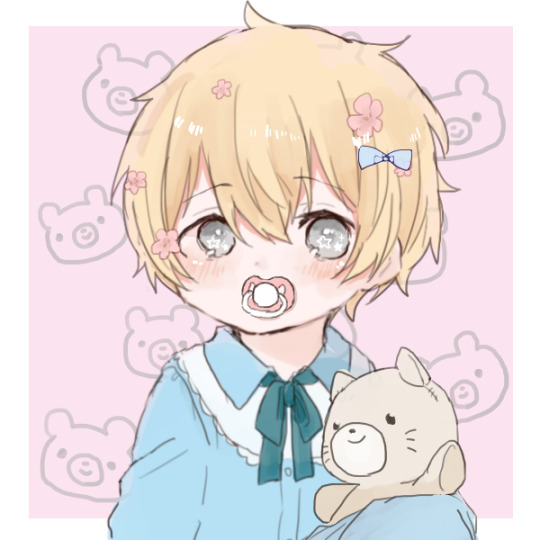
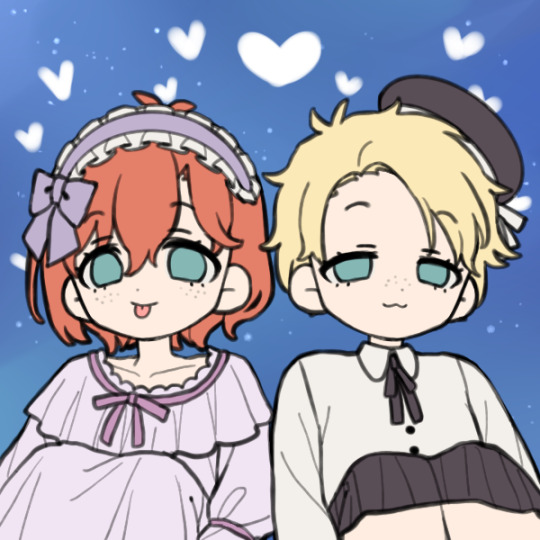
#Lafayette kids#lafayette children#georges de lafayette#anastasie de lafayette#virginie de lafayette#ooc post
3 notes
·
View notes
Photo
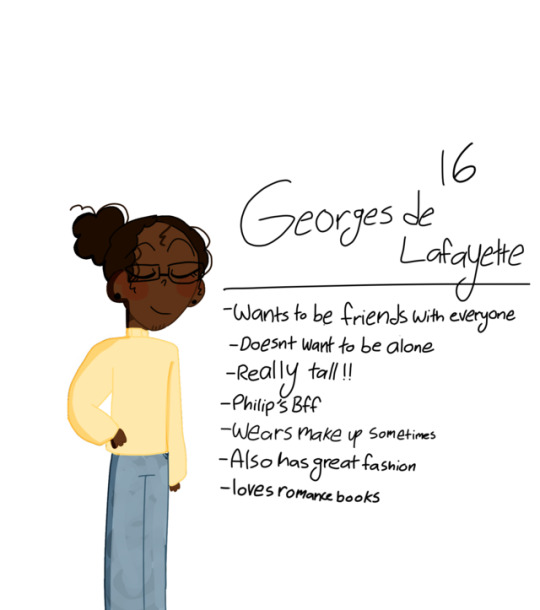

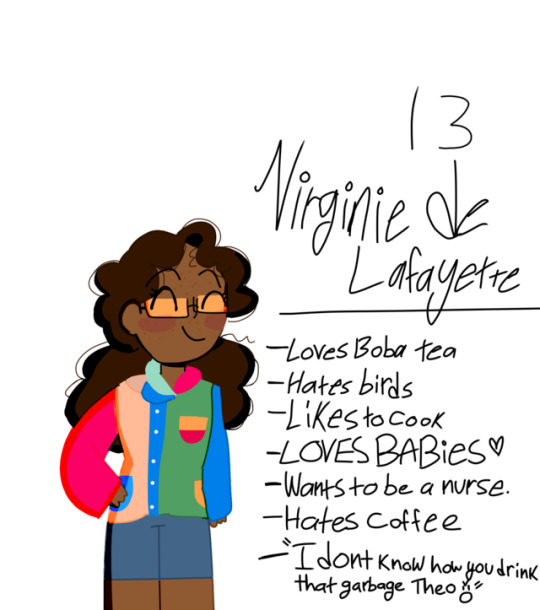

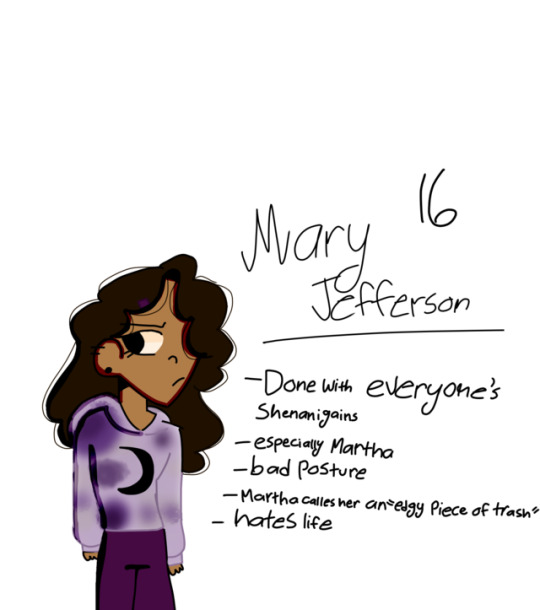
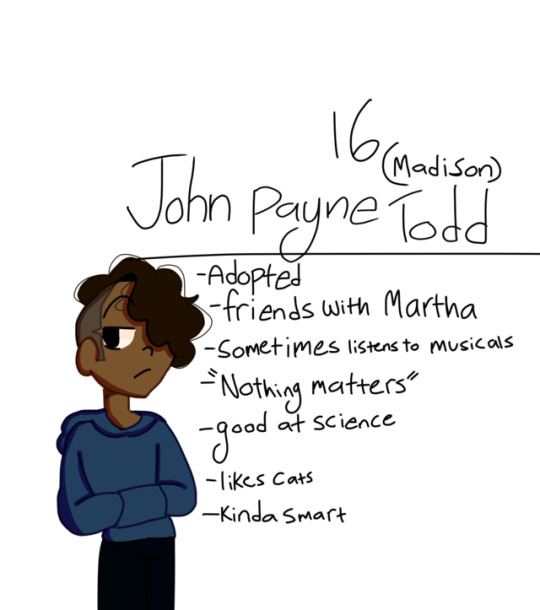
So I drew the Hamilton characters’ children in modern times and this is part 2 of them!
(I am making an ask blog for them) ;)
#georges de lafayette#anastasie de lafayette#virgine de lafayette#martha jefferson#mary jefferson#john payne todd madison#booperdooper
38 notes
·
View notes
Text
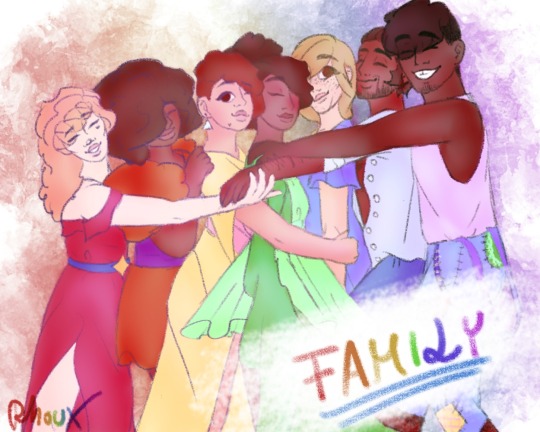
Wonderland AU! Yay!
I hate drawing group pictures, but I actually like the result of this one!
Anyways, there are two versions of this pic, but for the second one:
Warning: bright colors

It's.. it's hard to explain. But if anybody wants to know more about the AU, I'm willing to try to explain!

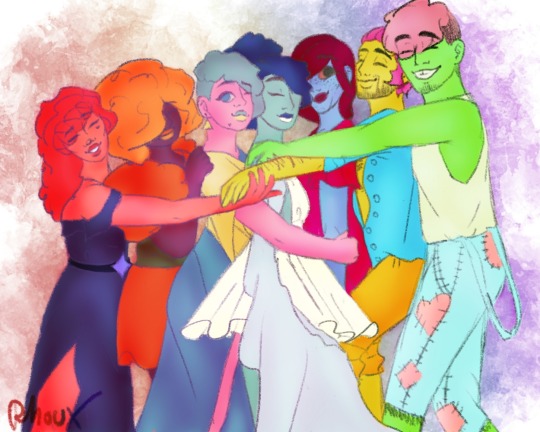



#hamilton an american musical#my art#hamilton fanart#digital art#fan art#fanart#art#hamilton au#wonderland au#Lafayette family#adrienne de lafayette#henriette de lafayette#anastasie de lafayette#virginie de lafayette#gilbert du motier marquis de lafayette#gilbert de lafayette#georges de lafayette#frances laurens#laurens#ways of reality
21 notes
·
View notes